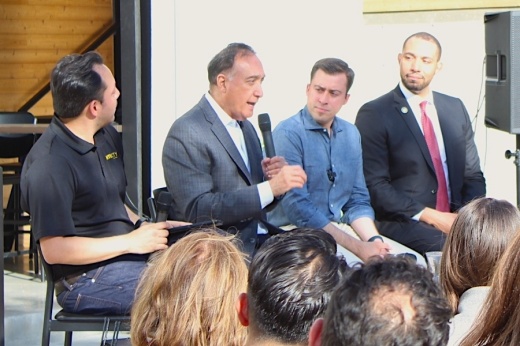What happened
Center City San Antonio, a civic organization, hosted a panel at Make Ready Market, a fledgling downtown mixed-use development, with former Mayor Henry Cisneros, Precinct 4 Bexar County Commissioner Tommy Calvert and entrepreneur Beto Altamirano.
Cisneros, a former U.S. Housing and Urban Development Department secretary in President Bill Clinton’s administration, urged local government and business leaders to get ahead of the curve and address various issues, including mass transportation, roads, housing, jobs, and water and power supplies, to ensure San Antonio adequately positively grows alongside Austin and other communities along the I-35 corridor.
Leaders with the Greater Austin-San Antonio Corridor Council, a San Marcos-based advocacy organization, said the Austin-San Antonio region is one of the nation’s fastest-growing regions with more than 5 million residents. Corridor council officials said the region’s population is projected to hit between 6 million and 7 million by 2030.
According to recently released U.S. Census Bureau data, the San Antonio-New Braunfels metropolitan area’s population reached 2.7 million in summer 2023.
Cisneros, a founder and senior adviser with New York-based company American Triple I, said communities all along the I-35 corridor must plan for continued growth in different ways.
“If we don't take smart action, we're going to regret it because we're going to be living in an area that has grown and will grow much faster,” Cisneros said.
Calvert agreed with Cisneros, saying communities in the San Antonio-Austin region will benefit from long-term planning. Calvert referenced growing Western U.S. cities that are facing projected water shortages.
Closer to home, he said state leaders must take action to upgrade and modernize Texas' power grid, which was a source of a criticism during power outages that affected millions statewide during a record cold snap in February 2021.
Calvert also said he hopes commuter rail becomes a reality Austin and San Antonio, and that efforts must be taken to better train local workforces and expand housing affordability.
“The No. 1 way to build wealth is housing and home ownership,” Calvert said.
Altamirano, CEO and co-founder of high-tech company Irys, has worked with various levels of federal and local government. His past work experiences include representing the United States on the United Nations Economic Commission for Europe's Task Force on Digitalization in Energy.
Altamirano echoed Calvert and Cisneros’ sentiments about the importance of tackling overarching subjects, such as public transportation, education and workforce development. But Altamirano said it is vital that members of San Antonio's public and private sectors do what they can to protect local small businesses, and partner to provide a quality of life that convinces local residents to stay in town and outsiders to come to San Antonio.
“We need to protect our small business in San Antonio because those are the ones that attract people to San Antonio and to Austin, and to all the cities in between,” Altamirano said.
A closer look
The three panelists also said San Antonio and Austin should view each other as collaborators, and not competitors, who could gain from partnering on initiatives to matters such as public transit, enhancing educational and job opportunities, and even recreation, where Cisneros said both cities should team up to lure another major professional sports team to the area.
The panelists said it will take insightful, dynamic political and business leaders in San Antonio and Austin to work together with area civic and community groups, find common ground on the aforementioned issues, and realize solutions for challenges that accompany growth.
“It sounds like we have to create some structure where some people have responsibility for the region or where we’re all thinking about the region as a whole,” Calvert said. “Government tends to be reactive, not proactive. I think our leadership needs to take more risk, and it needs to be more visionary.”
Cisneros said one of his biggest regrets is that, while serving as San Antonio’s mayor, he failed to take a stronger stance with supporters of commuter and light rail years ago. He added that critics and opponents spread misinformation and undermined pro-rail efforts especially among grassroots groups and other constituencies that had no incentive to buy into a rail proposal.
Cisneros and his fellow panelists panelists said attempts to create or expand high-speed rail systems in Texas metropolitan areas or to connect major Texas cities have faced various political, legal and financial obstacles, including most recently Texas Attorney General Ken Paxton exploring the legitimacy of financing for Austin’s Project Connect rail system.
At the same time, the panelists said other Texas rail efforts appear to be advancing, including Texas Central’s initiative to use high-speed rail to link Dallas and Houston.
“We should have gotten rail started a long time ago. It was a mistake not to, and so education is very important in making sure that special interests don't take over the debate," Cisneros said.





